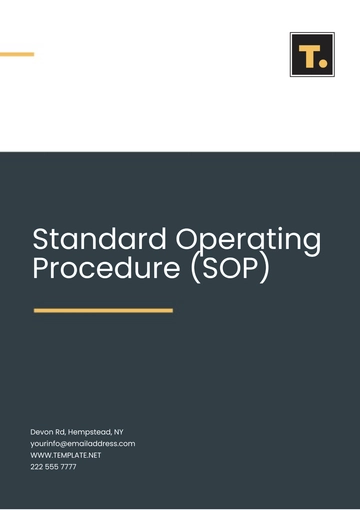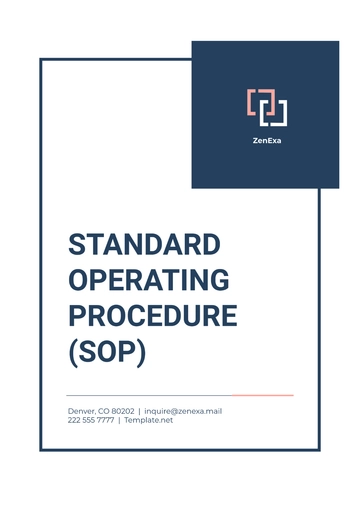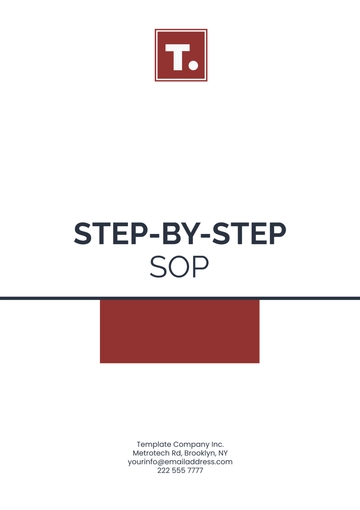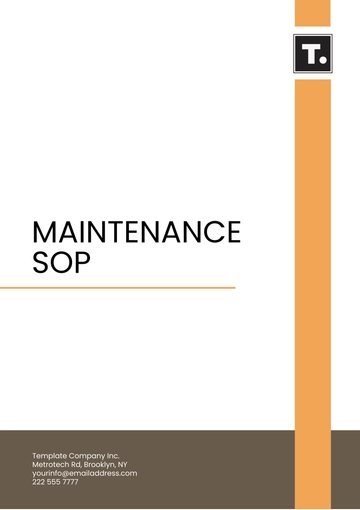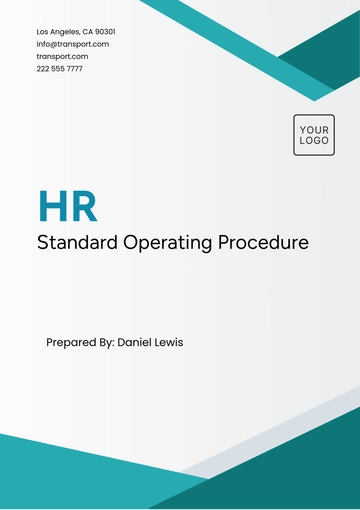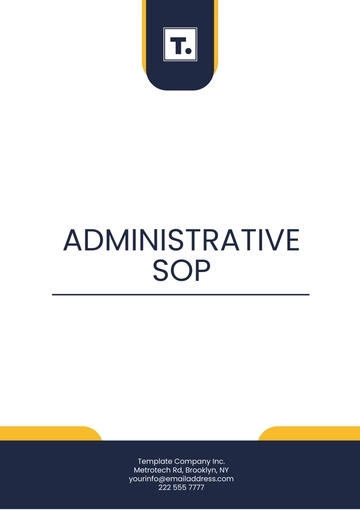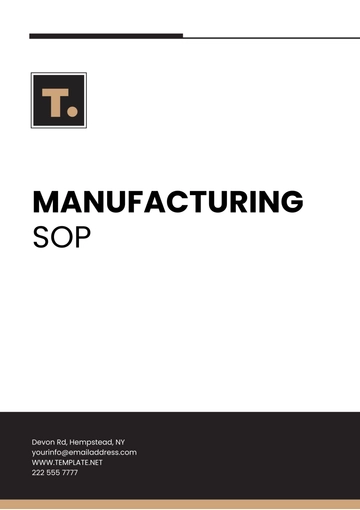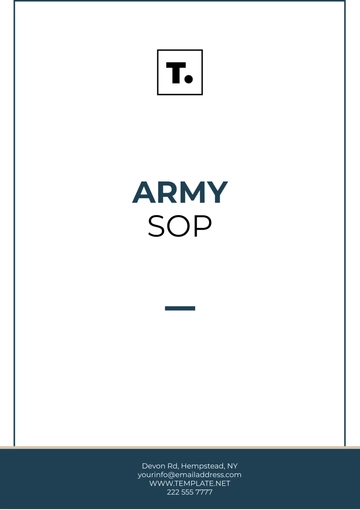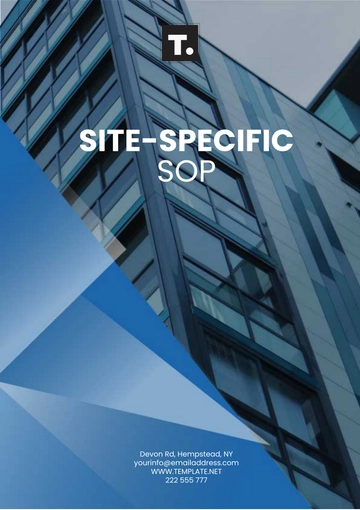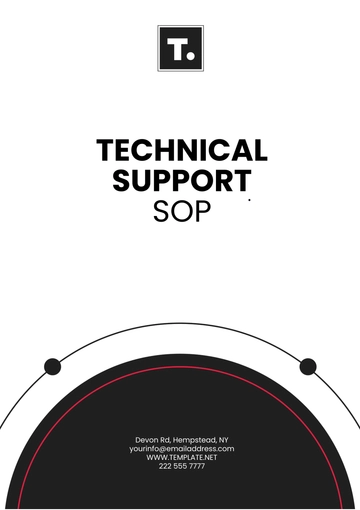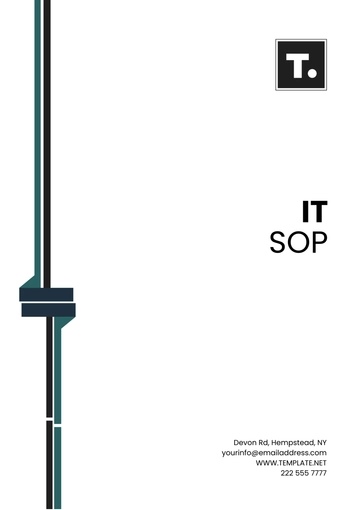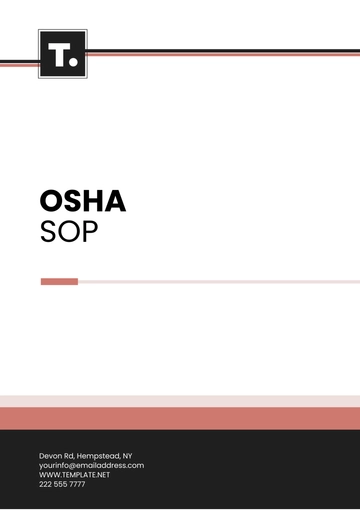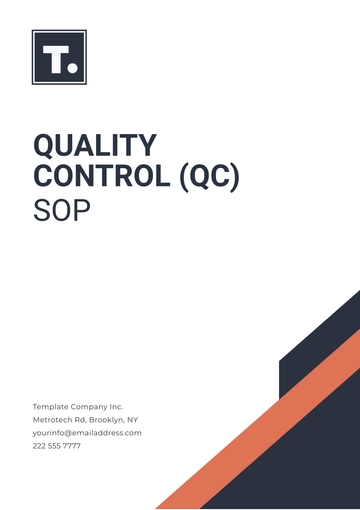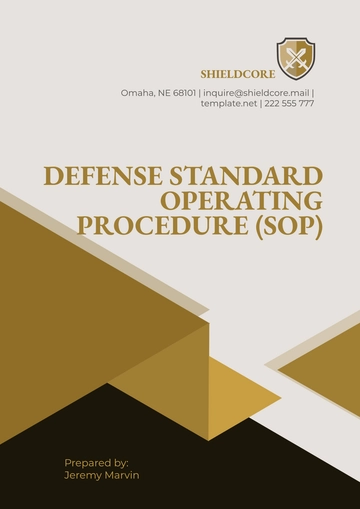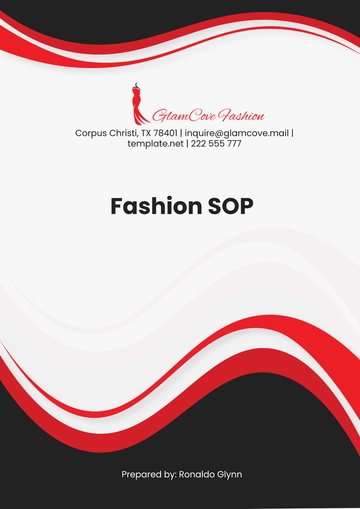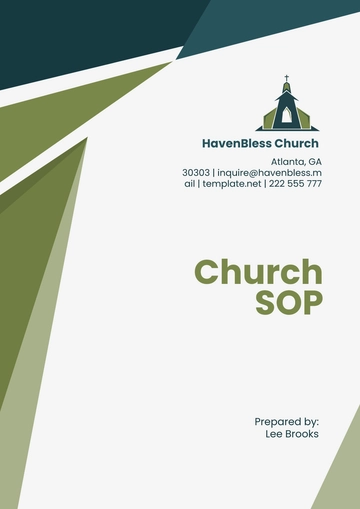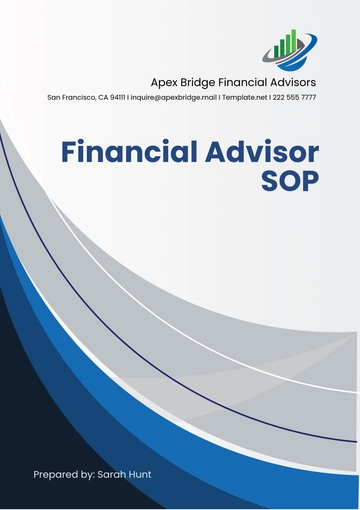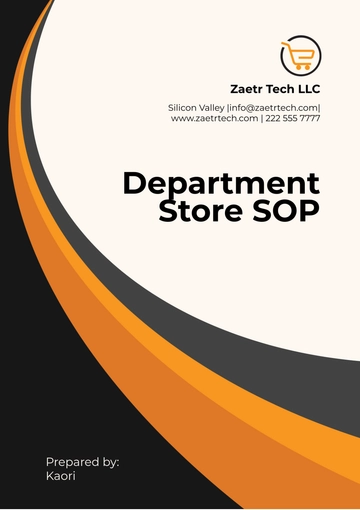Free Financial Compliance SOP
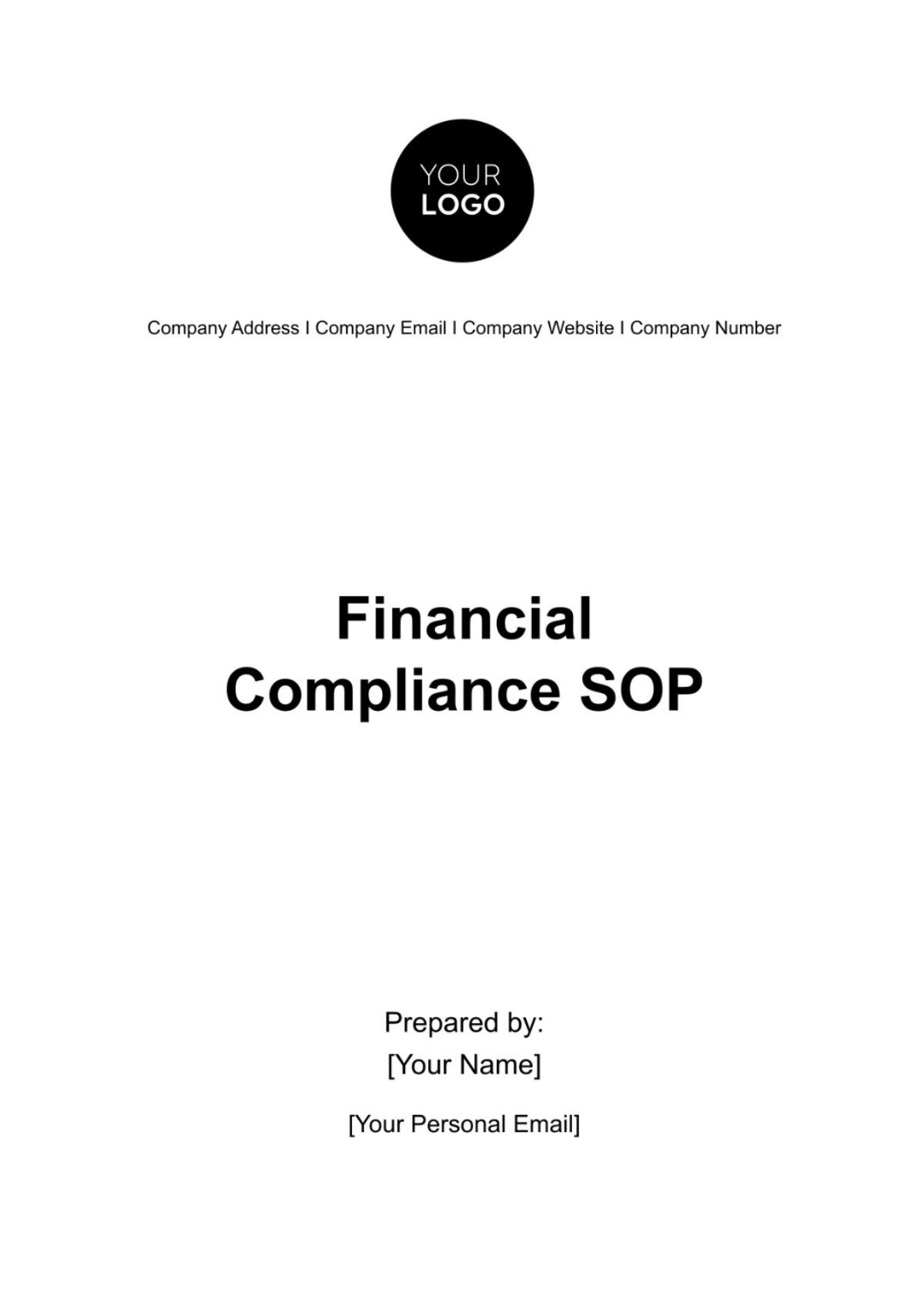
Introduction
The purpose of this Standard Operating Procedure (SOP) document is to formalize the financial compliance practices of [Your Company Name]. In the dynamic landscape of finance, it is imperative for businesses to maintain a robust framework that ensures strict adherence to legal, regulatory, and internal policy requirements. This document serves as a guide to managing financial transactions and reporting in a manner that aligns with both external legal standards and internal ethical benchmarks.
Financial compliance is not just about adhering to laws; it's about cultivating a culture of transparency and accountability within [Your Company Name]. As financial regulations evolve and the business landscape becomes increasingly complex, this SOP will serve as a living document, guiding employees, contractors, and consultants in navigating the intricacies of financial operations. This document is crafted with the understanding that financial compliance is a critical pillar in maintaining the integrity, reputation, and operational success of [Your Company Name].
Objective
The primary objective of this SOP is to establish a standardized approach to financial compliance across all levels of [Your Company Name]. This approach encompasses several key goals:
Risk Minimization: By standardizing financial procedures, we aim to significantly reduce the risks associated with financial irregularities. This includes preventing fraud, avoiding financial penalties due to non-compliance, and mitigating operational risks linked to financial mismanagement.
Transparency and Integrity: Ensuring that all financial transactions are conducted in a transparent manner is crucial. This SOP aims to cultivate an environment where integrity is at the forefront of all financial dealings, fostering trust among stakeholders, including investors, clients, and regulatory bodies.
Legal and Ethical Compliance: Adherence to legal requirements is non-negotiable. This SOP provides a framework for complying with local, national, and international financial regulations. Equally important is the adherence to ethical standards, which enhances our corporate reputation and ensures long-term sustainability.
Consistency in Financial Reporting: Standardized procedures ensure consistency and accuracy in financial reporting. This consistency is vital for internal assessments, external audits, and for maintaining investor confidence.
Educational Resource: This document serves as an educational tool for all members of [Your Company Name], equipping them with the knowledge and skills necessary to perform their financial responsibilities effectively.
Scope
The scope of this SOP is comprehensive and inclusive, applying to all individuals at [Your Company Name] who are involved in any aspect of financial transactions or reporting. This includes, but is not limited to:
Employees: All full-time and part-time employees, regardless of their role or level within the company, are expected to understand and adhere to the practices outlined in this SOP when engaging in financial activities.
Contractors and Consultants: External professionals who are engaged in financial activities on behalf of [Your Company Name] are also bound by the stipulations of this SOP. Their compliance is crucial in maintaining the integrity of our financial operations.
Departmental Interaction: While the Finance Department is primarily responsible for the implementation and monitoring of these procedures, inter-departmental cooperation is essential. Departments such as Human Resources, Operations, and Sales must collaborate to ensure a cohesive approach to financial compliance.
This SOP is not merely a set of guidelines; it is a commitment by [Your Company Name] to uphold the highest standards of financial conduct. Every individual associated with the company plays a vital role in realizing this commitment, thereby contributing to the overall success and reputation of [Your Company Name].
Responsibility
The successful implementation of this Financial Compliance SOP requires a clear delineation of responsibilities. It is essential that each party involved understands their role in upholding the financial integrity of [Your Company Name]. The responsibilities are categorized as follows:
Finance Department:
The Finance Department holds a pivotal role in ensuring the effective execution of this SOP. Their responsibilities include:
Regulatory Compliance: Stay abreast of current financial laws and regulations at local, national, and international levels. This involves continuous monitoring of legislative changes and ensuring that all financial practices of [Your Company Name] comply with these laws.
SOP Implementation and Oversight: Lead the implementation of this SOP. This includes developing detailed procedures, guidelines, and checklists to facilitate compliance. The department is also responsible for monitoring adherence to these procedures across the organization.
Financial Reporting and Record-Keeping: Ensure accurate and timely financial reporting. This encompasses all aspects of financial management including accounting, auditing, and reporting. Maintaining comprehensive records that demonstrate compliance is a critical part of this responsibility.
Training and Support: Provide ongoing training and support to employees, contractors, and consultants regarding financial compliance. This includes developing training materials, conducting workshops, and being available to answer queries related to financial procedures and regulations.
Regular Audits and Reviews: Conduct regular internal audits and reviews to ensure ongoing compliance. This includes evaluating the effectiveness of current practices and making necessary adjustments to the SOP.
Liaison with External Parties: Act as the primary point of contact for external auditors, regulatory agencies, and other financial institutions. This role involves coordinating audits, submitting required documentation, and ensuring external compliance requirements are met.
All Employees:
Every employee at [Your Company Name] has a role to play in ensuring financial compliance. Their responsibilities include:
Adherence to SOP: Familiarize themselves with the SOP and adhere to all the financial procedures and guidelines as outlined. This includes following proper channels for financial transactions, reporting, and documentation.
Reporting Discrepancies and Concerns: Employees are encouraged to report any discrepancies, unusual activities, or concerns regarding financial misconduct. This should be done through the appropriate channels, ensuring confidentiality and protection from retaliation.
Continuous Learning: Engage in training programs and educational sessions provided by the company to stay informed about financial compliance requirements and best practices.
Ethical Conduct: Maintain ethical conduct in all financial matters. This includes avoiding conflicts of interest, refraining from fraudulent activities, and upholding the highest standards of honesty and integrity.
Collaboration and Communication: Collaborate with the Finance Department and other relevant departments to ensure cohesive financial practices. Open communication is encouraged to foster a transparent and compliant financial environment.
By clearly defining these responsibilities, [Your Company Name] aims to create a robust framework for financial compliance, where each individual's role is integral to the financial integrity and success of the organization.
Procedures
The procedures outlined in this chapter form the core operational framework for financial compliance at [Your Company Name]. These procedures are designed to ensure that all financial activities are conducted in a systematic, transparent, and legally compliant manner. Each subsection details specific activities, assigns responsible parties, stipulates the frequency of these activities, and lists the necessary documentation to maintain an auditable trail.
Financial Reporting
Financial reporting is critical for the transparency and integrity of [Your Company Name]. It encompasses various activities that contribute to the accurate representation of the company's financial status.
Activity | Responsible Party | Frequency | Documentation |
|---|---|---|---|
Financial Statement Preparation | Finance Team | Quarterly | Balance Sheet, Income Statement, Cash Flow Statement |
Tax Filing | External Accountant | Annually | Tax Return Document |
Expense Management
Expense management is fundamental to maintaining the financial health of the company. It ensures that all expenditures are legitimate, necessary, and aligned with the company's financial objectives.
Activity | Responsible Party | Frequency | Documentation |
|---|---|---|---|
Expense Reporting | All Employees | As Incurred | Expense Report Form |
Approval of Expenses | Department Heads | As Incurred | Approved Expense Document |
Internal Audits
Internal audits are crucial for assessing the effectiveness of financial controls and procedures. They provide an independent evaluation of the company's compliance with financial regulations and internal policies.
Activity | Responsible Party | Frequency | Documentation |
|---|---|---|---|
Audit Planning | Internal Audit Team | Annually | Audit Plan |
Execution of Audit | Internal Audit Team | As Per Audit Plan | Audit Report |
Compliance Training
Regular compliance training ensures that all employees are aware of their responsibilities in financial matters and are up-to-date with current financial compliance practices.
Activity | Responsible Party | Frequency | Documentation |
|---|---|---|---|
Training Sessions | HR | Bi-Annually | Training Attendance Sheet |
Compliance Monitoring and Reporting
The foundation of a robust financial compliance program lies in consistent monitoring and efficient reporting mechanisms. This ensures that the financial activities of [Your Company Name] remain in alignment with established SOPs and regulatory requirements.
Regular Monitoring
Finance Department Responsibilities: The Finance Department is tasked with conducting monthly reviews of all financial activities within the company. This includes scrutinizing transactions, assessing financial statements, and evaluating the adherence of various departments to the compliance standards. These regular audits help in identifying potential compliance risks or procedural breaches early, allowing for timely corrective actions.
Data Analysis and Record Keeping: Part of the monitoring process involves a thorough analysis of financial data and maintaining detailed records of these reviews. This ensures that there is a traceable record of compliance checks, which is essential for both internal assessments and external audits.
Reporting Mechanism
Channel for Reporting Issues: Any issues, discrepancies, or concerns related to financial compliance should be promptly reported to [Your Company Email]. This established channel ensures that employees have a direct and confidential means to report any compliance concerns.
Response to Compliance Issues: Upon receiving a report of non-compliance, the Finance Department is responsible for investigating the issue. Appropriate actions, including corrective measures and potentially involving other departments or external consultants, will be taken based on the nature of the issue.
Policy Review and Update
To ensure that the Financial Compliance SOP remains relevant and effective, a regular review and update mechanism is in place.
Review Frequency
Annual Reviews: The SOP is subject to an annual review. This review process is comprehensive, involving an evaluation of the effectiveness of current procedures, relevance to current financial laws and practices, and feedback from employees and management.
Updates
Approval Process: Any updates or amendments to the SOP are subject to approval by [Appropriate Authority]. This ensures that changes are made thoughtfully and in line with the company's broader financial and operational strategies.
Incorporation of Changes: Following approval, updates are formally incorporated into the SOP. Relevant parties are then informed of these changes, and necessary training or briefings are conducted to ensure seamless implementation.
Non-Compliance
Non-compliance with the Financial Compliance SOP is a serious matter and is subject to disciplinary action by [Your Company Name].
Disciplinary Actions: Consequences of non-compliance can range from warnings to termination, depending on the severity and nature of the violation. This underscores the importance [Your Company Name] places on financial integrity and compliance.
Process for Addressing Non-Compliance: The company follows a structured process for dealing with non-compliance, which includes investigation, consultation with relevant departments, and a fair but firm approach to disciplinary measures.
Related Documents
The Financial Compliance SOP should be read and understood in conjunction with other relevant company policies. These documents provide additional guidance and detail on specific aspects of financial management.
Internal Financial Policy: This document outlines the internal financial controls and procedures of [Your Company Name].
Expense Management Policy: This policy provides detailed guidelines on how company expenses should be reported, approved, and monitored.
Tax Compliance Policy: This policy outlines the procedures and responsibilities related to tax reporting and compliance, ensuring adherence to relevant tax laws and regulations.
Document Approval
Prepared by: [Your Name]
Approved by: [Appropriate Authority]
Date: [Month Day Year]
- 100% Customizable, free editor
- Access 1 Million+ Templates, photo’s & graphics
- Download or share as a template
- Click and replace photos, graphics, text, backgrounds
- Resize, crop, AI write & more
- Access advanced editor
Streamline your financial compliance procedures with Template.net's editable Financial Compliance SOP Template. This versatile template is designed to simplify your regulatory adherence processes. With customizable sections and expert guidance using our AI editor tool, it ensures your organization's financial operations meet industry standards. Eliminate compliance worries and enhance efficiency starting now!
